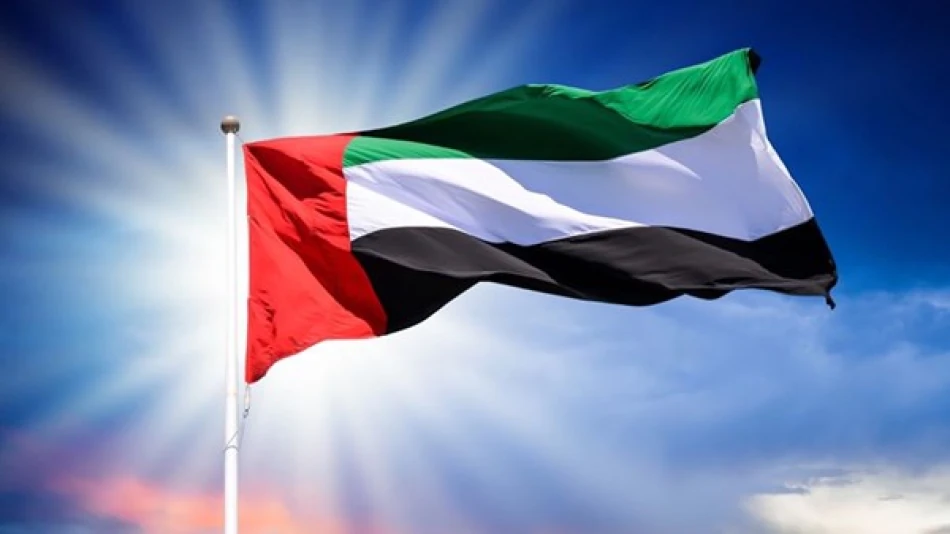
UAE Joins Global and Traditional Religious Leaders' Conference in Astana
UAE Emerges as Global Guardian of Religious Heritage Through Strategic Cultural Diplomacy
The United Arab Emirates is positioning itself as a leading protector of religious sites worldwide, using heritage preservation as a cornerstone of its soft power strategy. At the eighth Conference of World and Traditional Religious Leaders in Kazakhstan, UAE officials highlighted their nation's expanding role in safeguarding places of worship across different faiths, from ancient Christian monasteries on their own territory to historic mosques and churches in conflict zones.
From Local Discovery to Global Mission
Dr. Omar Habtoor Al Darei, Chairman of the UAE's General Authority of Islamic Affairs, Endowments and Zakat, outlined the country's comprehensive approach to religious site protection during a specialized session on the topic. His presentation traced the UAE's journey from archaeological discoveries within its borders to international restoration projects spanning multiple continents.
The story begins with the early 1990s discovery of a church and monastery on Sir Bani Yas Island, now recognized as one of the UAE's most significant religious archaeological sites. This find revealed the region's deep historical connections to Christianity, predating the Islamic period and demonstrating the area's role as a crossroads of civilizations.
The Zayed Legacy: Setting the Standard
The UAE's modern approach to interfaith preservation stems directly from the vision of Sheikh Zayed bin Sultan Al Nahyan, the nation's founding father. In 2002, Sheikh Zayed personally funded the restoration of the Church of the Nativity in Jerusalem while simultaneously supporting the renovation of the adjacent Omar ibn al-Khattab Mosque—a powerful symbol of religious coexistence that would define the UAE's future diplomatic approach.
Strategic Investments in Post-Conflict Reconstruction
The UAE's most ambitious religious preservation project recently culminated in Iraq, where Emirati funding supported the five-year reconstruction of Mosul's Great Mosque of al-Nouri and its iconic leaning minaret. The historic mosque, destroyed during ISIS occupation, represented more than architectural heritage—its restoration symbolized the defeat of extremism and the revival of Iraq's multicultural identity.
Complementing this Islamic site restoration, the UAE simultaneously funded repairs to Mosul's al-Tahera and al-Saa churches, both considered historical and civilizational symbols of the Iraqi city. This dual approach—supporting both Islamic and Christian heritage in the same location—exemplifies the UAE's strategic use of religious preservation as a diplomatic tool.
Competitive Advantage in Middle Eastern Diplomacy
Unlike regional powers that focus primarily on promoting their own religious traditions abroad, the UAE's inclusive approach to heritage preservation creates unique diplomatic opportunities. While Saudi Arabia invests heavily in Islamic institutions globally and Iran supports Shia religious sites, the UAE's willingness to fund Christian, Jewish, and other religious heritage projects positions it as a neutral mediator in interfaith dialogue.
Archaeological Diplomacy: Recent Discoveries Reinforce Narrative
The recent discovery of an ancient cross at the Christian monastery on Sir Bani Yas Island provides timely reinforcement of the UAE's message. These archaeological finds serve as physical evidence of the region's historical tolerance and diversity, supporting the government's contemporary policies with historical precedent.
This approach mirrors successful cultural diplomacy strategies employed by countries like France and Italy, which leverage their cultural heritage to enhance international influence. However, the UAE's focus on religious sites across different faiths represents a unique variation on this theme, particularly valuable in a region marked by sectarian tensions.
Economic and Political Returns on Cultural Investment
The UAE's religious preservation initiatives generate multiple strategic benefits beyond diplomatic goodwill. These projects enhance the country's reputation among global religious communities, potentially attracting religious tourism and positioning the UAE as a hub for interfaith dialogue and cooperation.
For international investors and businesses, the UAE's demonstrated commitment to religious tolerance and cultural preservation signals political stability and social moderation—crucial factors in long-term investment decisions. This soft power approach complements the country's economic diversification strategy, moving beyond oil dependence toward knowledge-based and service-oriented industries.
The timing of these announcements, delivered at a major international religious conference, demonstrates sophisticated public diplomacy. By presenting concrete examples of preservation work rather than abstract policy statements, UAE officials provide tangible evidence of their commitment to religious coexistence—a message that resonates particularly strongly in an era of rising global religious tensions.
Most Viewed News

 Layla Al Mansoori
Layla Al Mansoori






